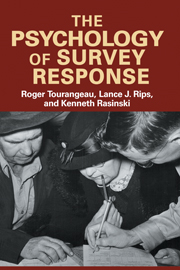Book contents
- Frontmatter
- Contents
- Preface
- 1 An Introduction and a Point of View
- 2 Respondents' Understanding of Survey Questions
- 3 The Role of Memory in Survey Responding
- 4 Answering Questions about Dates and Durations
- 5 Factual Judgments and Numerical Estimates
- 6 Attitude Questions
- 7 Attitude Judgments and Context Effects
- 8 Selecting a Response: Mapping Judgments to Survey Answers
- 9 Editing of Responses: Reporting about Sensitive Topics
- 10 Mode of Data Collection
- 11 Impact of Cognitive Models on Survey Measurement
- References
- Author Index
- Subject Index
3 - The Role of Memory in Survey Responding
Published online by Cambridge University Press: 05 June 2012
- Frontmatter
- Contents
- Preface
- 1 An Introduction and a Point of View
- 2 Respondents' Understanding of Survey Questions
- 3 The Role of Memory in Survey Responding
- 4 Answering Questions about Dates and Durations
- 5 Factual Judgments and Numerical Estimates
- 6 Attitude Questions
- 7 Attitude Judgments and Context Effects
- 8 Selecting a Response: Mapping Judgments to Survey Answers
- 9 Editing of Responses: Reporting about Sensitive Topics
- 10 Mode of Data Collection
- 11 Impact of Cognitive Models on Survey Measurement
- References
- Author Index
- Subject Index
Summary
Surveys aim to discover facts about the respondents – often biographical facts about them. Respondents can sometimes answer factual questions on the basis of external records or documents, such as sales receipts, deposit slips, birth certificates, and the like, but more often they have to rely on memory for the information. Even easy questions like “What is your name?” or “Where do you live?” require respondents to consult their memory. Some survey questions, such as (1), from the 1988 National Health Interview Survey, may require memory feats of considerable difficulty:
(1) In what year did you first have an episode of back pain lasting a week or more? [HIS]
The greater the demands a question places on memory, the less accurate the respondents' answers and, all else being equal, the less accurate the survey estimates derived from them.
Attitude questions, like factual questions, require the respondents to search their memory. When the General Social Survey asks whether “you would approve of an adult male punching a stranger if the stranger was beating up a woman and the man saw it,” the respondent must search his or her memory for relevant information before making a response. But attitude questions pose special problems because the respondent may never have considered the issue prior to the survey. For this reason, we postpone considering attitude questions until Chapter 6, and we concentrate here on memory for biographical facts about the respondents.
- Type
- Chapter
- Information
- The Psychology of Survey Response , pp. 62 - 99Publisher: Cambridge University PressPrint publication year: 2000
- 4
- Cited by



